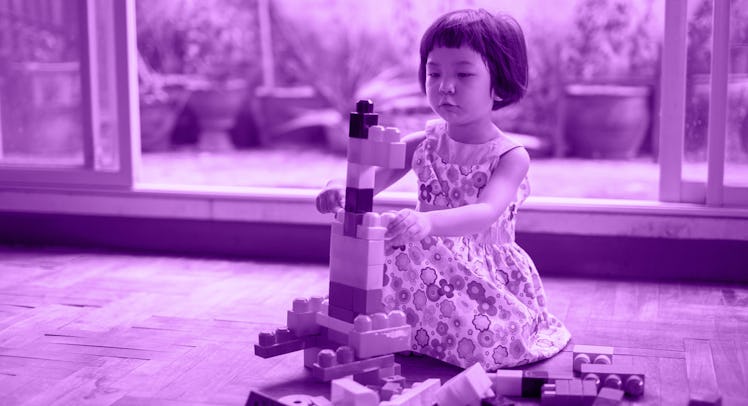Don’t Worry if Your Kid Plays Alone
Introversion in and of itself is not a problem that needs to be corrected.

Seeing your kid playing alone, especially when his or her peers are playing together as a group, can be disappointing. You may feel an instinct to intervene, and work to help your child gain friends at all costs. But butting-in may not always be the best option and, in most cases, you probably just need to chill.
“Parents should try really hard not to transpose their own fears and feelings onto their children,” says Sarah Ockwell-Smith, author of the book Gentle Discipline. “I tend to find those who struggle the most are parents who are naturally very extroverted, the life and soul of the party with a wide circle of friends, who are raising naturally introverted children who prefer to play alone, or with just one close friend.”
READ MORE: The Fatherly Guide to Socializing Kids
This is especially true if your child has not yet entered kindergarten. Kids under the age of four will often engage in parallel play. That’s when two kids may be in the same room playing in proximity to each other, but really playing alone—like two adults sitting at the same table, but each staring at their phones.
Parallel play is crucial, because it’s how children socialize before their sense of social etiquette kicks in. Over time, “children begin to understand that not everybody thinks and feels the same way,” Ockwell-Smith says. But before that, “when they are incredibly egocentric, a young child will believe that the toy they are playing with is theirs—even if it isn’t and others want to play with it too.” This is why some toddlers come off as real jerks. And nobody wants to play with a jerk.
The upshot is that parents need to make a judgement call, and determine whether their children prefer to play alone, are not developmentally ready to engage, or are incapable of engaging. “Difficulty with social relationships can be an indicator of an Autism Spectrum Disorder and children with other special education needs, such as ADHD, may struggle to form relationships with their peers,” Ockwell-Smith explains. “But often the issue is more adults expecting children to behave like adults.”
But introversion in and of itself is not a problem that needs to be corrected. “Some adults prefer to be alone—I’m an introverted only child and, at 41, still generally prefer to be me in my own company,” Ockwell-Smith says. “Allow them to be themselves—even if it’s very different to how you were as a child, or think they should be. The worst thing you can do is try to change them—try to make them more sociable, or play more with others—this almost always backfires!”
This article was originally published on